In the rapidly growing global marketplace, having access to reliable information is vital. If you are looking to search for business information in Singapore, there are several robust resources available that cater to various needs of entrepreneurs, researchers, and investors. This guide will help you navigate the extensive landscape of information concerning local businesses, foreign companies operating within Singapore, and relevant legislation, paving the way for informed business decisions.
Searching for Singaporean Businesses: Online Resources and Strategies
In today’s digital age, finding information about Singaporean businesses has become easier than ever. Numerous online platforms provide comprehensive insights into different sectors, company profiles, and market trends. Below, we explore some effective resources and strategies for locating pertinent business information.

Government Websites
The Singapore government provides a wealth of information through its official websites. One of the most significant portals is the Accounting and Corporate Regulatory Authority (ACRA) website. It serves as the main repository of company registration data, financial statements, and regulatory compliance documentation.
Navigating through this website allows users to search for business entities registered in Singapore using their unique registration numbers or business names. Moreover, ACRA’s e-services enable users to access detailed reports, which include valuable insights such as shareholding patterns, directors’ details, and more. The transparency provided by these government resources is crucial for conducting due diligence and verifying the legitimacy of business partners.
Online Business Directories
Apart from governmental sources, online business directories like Yellow Pages, Singapore Business Directory, and Kompass serve as excellent tools for searching businesses in Singapore. These platforms categorize companies based on industry, allowing users to filter results according to specific criteria.
These directories often feature user reviews and ratings, providing additional context on the reputation and reliability of listed businesses. They can be an invaluable asset, especially for small enterprises looking to connect with suppliers or clients. Utilizing these directories facilitates networking opportunities and enhances visibility in the competitive landscape of Singapore.
Social Media Platforms
Social media has evolved into a powerful tool for discovering, analyzing, and connecting with businesses. Platforms such as LinkedIn, Facebook, and Instagram allow users to engage with companies, view their posts, and even gain insights into their organizational culture.
LinkedIn, in particular, stands out as a professional networking site where users can find detailed information about companies, including employee profiles, recent updates, and industry connections. Engaging with businesses through social media can foster relationships and provide a more nuanced understanding of their operations and values.
Locating Foreign Companies Operating in Singapore: Essential Tools and Techniques
Singapore is known for its open economy and favorable business environment, making it an attractive destination for foreign companies. For those seeking to search for foreign businesses in Singapore, various tools and techniques can facilitate this task.
International Business Databases
Databases like Orbis and Bloomberg offer comprehensive information on international businesses operating in Singapore. These platforms compile data from multiple sources, providing detailed profiles, financial performance, and market analyses for companies worldwide.
By leveraging these databases, users can identify foreign companies, understand their market positioning, and analyze their growth trajectories. Additionally, these tools often include valuable insights into mergers and acquisitions, enabling strategic decision-making for potential partnerships or investments.
Trade Associations and Chambers of Commerce
Trade associations and chambers of commerce play a pivotal role in promoting cross-border trade and investment. Organizations such as the Singapore Chamber of Commerce and the American Chamber of Commerce in Singapore maintain directories of their members, many of whom are foreign companies engaged in various sectors.
Connecting with these organizations not only aids in locating foreign businesses but also opens doors to networking events, seminars, and workshops tailored specifically for international firms. Such engagements can be instrumental in building relationships and exploring collaborative opportunities.
Industry-Specific Reports
Industry reports published by market research firms provide targeted insights into specific sectors, revealing the presence of foreign companies operating in Singapore. Reports from reputable organizations like McKinsey & Company, Deloitte, and PwC cover market trends, competitive landscapes, and key players in various industries.
Accessing these reports equips businesses with the knowledge necessary to identify foreign competitors and assess market dynamics. By understanding the competitive landscape, companies can tailor their strategies to better position themselves within Singapore’s vibrant business ecosystem.
Navigating Singapore’s Business Landscape: Key Websites and Databases
Navigating the intricate business landscape of Singapore requires familiarity with essential online resources. Several key websites and databases offer business intelligence, facilitating informed decision-making for entrepreneurs and investors.
ACRA Business Directory
As mentioned earlier, the Accounting and Corporate Regulatory Authority (ACRA) remains a cornerstone for business information in Singapore. Its business directory provides access to comprehensive data on registered companies, including their status, activities, and filing history.
Utilizing the ACRA directory enables users to conduct thorough research on potential business partners, ensuring they have the necessary information for successful collaborations. This level of transparency fosters trust among businesses, reinforcing Singapore’s reputation as a hub for integrity and excellence in business dealings.
SGX (Singapore Exchange)
The Singapore Exchange (SGX) is another critical resource for finding information related to publicly listed companies in Singapore. The SGX website offers access to financial statements, stock performance data, announcements, and corporate governance reports.
Investors and analysts can use the SGX platform to track the performance of listed companies, assess their financial health, and make informed trading decisions. The availability of this data empowers stakeholders to stay abreast of market developments and capitalize on investment opportunities.
Market Research Firms
Market research firms like Statista, IBISWorld, and Euromonitor provide in-depth analysis and reports on Singapore’s economic landscape, industry trends, and consumer behavior. These platforms aggregate data from various sources, offering valuable insights into the country’s business environment.
Subscribers can access sector-specific reports, which detail market share, growth forecasts, and competitive analysis. Such information is indispensable for businesses planning to enter or expand their operations in Singapore, as it lays the groundwork for effective strategy formulation.
Accessing Singaporean Legislation: Official Government Resources and Legal Databases
Understanding the legal framework governing business operations in Singapore is paramount for compliance and risk management. To find legislation in Singapore, several official government resources and legal databases are available.
Singapore Statutes Online
Singapore Statutes Online is the official portal where all laws and statutes enacted in Singapore are published. This comprehensive resource allows users to access current legislation, amendments, and historical versions of laws.
Staying updated on relevant legislation is crucial for businesses operating in Singapore, as non-compliance can lead to severe penalties. Regularly consulting this resource ensures businesses remain compliant with labor laws, tax regulations, and industry-specific requirements.
Ministry of Law
The Ministry of Law’s website offers an array of resources tailored to various aspects of legal practice and business compliance. Users can find information regarding legal frameworks, licensing requirements, and dispute resolution mechanisms.
Additionally, the ministry frequently publishes reports and updates on legal reforms, thereby keeping businesses informed about upcoming changes in legislation that may impact their operations.
Legal Databases
Access to legal databases like LexisNexis and Westlaw provides businesses with an extensive array of legal resources, case law, articles, and commentaries. These platforms enable users to conduct thorough research on specific legal issues, past cases, and legislative interpretations.
Having access to these databases equips businesses with the knowledge required to navigate complex legal environments effectively. Furthermore, it bolsters their ability to implement best practices for compliance and governance.
Effective Search Strategies for Identifying Businesses in Singapore
Searching for business information in Singapore requires strategic approaches to ensure accuracy and comprehensiveness. Implementing effective search strategies can significantly enhance the quality of information retrieved.
Keyword Optimization
Optimizing your search with relevant keywords is fundamental for retrieving accurate results. When searching online, consider using specific phrases and terminologies associated with the industry or sector of interest.
Utilizing advanced search operators can further refine results by filtering unnecessary information. For instance, incorporating terms such as “registered companies,” “financial reports,” or “business contacts” can yield more focused outcomes and save time during research.
Networking and Professional Connections
Building a network within Singapore’s business community can provide valuable insights and leads when searching for businesses. Engaging with professionals through networking events, conferences, and online forums can help gather first-hand information and recommendations.
Furthermore, participating in industry-specific groups on platforms like LinkedIn can facilitate connections that might lead to fruitful collaborations, partnerships, or referrals for information.
Leveraging Local Insights
Understanding local cultural nuances and business etiquette is essential for effective communication. Building rapport with local professionals can yield deeper insights into the business landscape and introduce you to niche markets that may not be readily visible through online searches.
Consider seeking mentorship or guidance from individuals well-acquainted with the Singaporean business environment. Their knowledge can significantly enhance your search efforts and provide clarity on navigating complexities within the market.
Understanding Singapore’s Business Registry: Accessing Company Information
Singapore’s business registry, maintained by ACRA, is a vital component of its regulatory framework. Understanding how to access and interpret the information contained within this registry is crucial for anyone seeking to conduct business in Singapore.
Company Registration Process
The company registration process in Singapore involves several steps outlined by ACRA. Prospective business owners must choose a suitable business structure, register their business name, and submit the necessary documentation.
Familiarizing yourself with this process can streamline your own business setup and ensure compliance with legal requirements. An understanding of the registry will also aid in identifying established businesses and evaluating their credibility.
Types of Company Information Available
The business registry contains a multitude of information on registered companies. Users can access details such as the company’s registration number, business address, nature of business, and particulars of directors and shareholders.
This information is essential for conducting due diligence before entering business relationships. By accessing the registry, stakeholders can verify the legitimacy of potential partners and ascertain their compliance with regulatory standards.
Importance of Transparency
Singapore’s emphasis on transparency in its business registry reflects its commitment to creating a trustworthy business environment. The accessibility of company information fosters accountability among businesses, discouraging unethical practices.
Moreover, this transparent approach enhances investor confidence, encouraging both local and foreign investments. As businesses operate under strict regulatory oversight, they contribute to creating a positive and stable economic climate in Singapore.
Leveraging Online Platforms to Find Business Opportunities in Singapore
In an interconnected world, online platforms serve as invaluable tools for identifying business opportunities. From job listings to partnership prospects, leveraging these resources can facilitate growth and innovation.
Job Portals
Job portals like JobStreet, JobsDB, and LinkedIn’s job search function offer insights into emerging businesses and sectors in Singapore. By monitoring job postings, users can gauge market demands and identify companies actively hiring talent.
This information can serve as a precursor to exploring collaborations or investment opportunities in high-growth sectors. Additionally, tracking industry-specific job trends can inform recruitment strategies for businesses looking to attract top talent.
B2B Marketplaces
Business-to-business (B2B) marketplaces such as Alibaba and Global Sources provide platforms for connecting suppliers and buyers across various industries. These platforms encompass a vast array of products and services, enabling businesses to explore new vendors or sales channels.
Leveraging B2B marketplaces can unlock opportunities for cost-effective sourcing, enhancing supply chain efficiency. Furthermore, they allow businesses to tap into global markets, expanding their reach beyond Singapore.
Innovation Hubs and Incubators
Singapore is home to many innovation hubs and incubators that support startups and entrepreneurial ventures. Platforms like Block71 and SGInnovate foster collaboration, mentorship, and funding opportunities for aspiring entrepreneurs.
Engaging with these innovation ecosystems can lead to valuable partnerships, access to funding, and exposure to cutting-edge technologies. As Singapore continues to position itself as a global innovation hub, leveraging these resources can drive business success.
Compliance and Legislation: Finding Relevant Laws and Regulations in Singapore
Ensuring compliance with legal and regulatory requirements is crucial for businesses operating in Singapore. Familiarity with relevant laws and regulations can mitigate risks and foster a culture of ethical business conduct.
Key Regulatory Bodies
Several regulatory bodies oversee compliance and governance in Singapore. Notably, the Monetary Authority of Singapore (MAS) regulates financial institutions, while the Ministry of Manpower (MOM) governs labor laws.
Understanding which agencies govern specific aspects of business operations is fundamental for compliance. Engaging with these bodies through their websites can provide clarity on regulatory expectations and reporting obligations.
Licensing and Permits
Different industries in Singapore require specific licenses and permits to operate legally. Conducting thorough research on the licensing requirements tailored to your business sector is paramount.
Failure to obtain the necessary licenses can lead to penalties or business shutdowns. Therefore, proactively seeking information on relevant permits ensures compliance and protects the company’s reputation.
Staying Informed on Legislative Changes
Legislation is dynamic and subject to change, necessitating continuous monitoring of relevant legal updates. Subscribing to newsletters from regulatory bodies or engaging with legal counsel can facilitate staying informed about significant changes in laws.
Participating in industry associations can also provide insights into impending regulatory shifts that could impact business operations. Being proactive in understanding legal changes enhances a company’s resilience and adaptability.
Best Practices for Researching Businesses and Legislation in Singapore
Conducting effective research on businesses and legislation in Singapore requires a structured approach. Adopting best practices can enhance the quality of information gathered and improve decision-making processes.
Setting Clear Objectives
Before embarking on research, establishing clear objectives is crucial. Define what specific information you wish to obtain, whether it pertains to company profiles, market trends, or legal requirements.
Setting goals helps streamline your research efforts and prevents information overload. This focus enables you to target specific resources and methodologies that align with your objectives.
Utilizing Multiple Sources
Relying on a single source for information may lead to biases or inaccuracies. Instead, utilizing a range of resources—government databases, industry reports, academic journals, and news articles—can provide a holistic view of the business landscape.
Cross-referencing data from various sources enhances credibility and supports informed decision-making. This multi-faceted approach ensures a comprehensive understanding of the subject matter.
Documenting Findings
As you gather information, maintaining organized records is essential. Create a systematic method for documenting findings, including citations for reference purposes.
Having a well-organized repository of researched information makes it easier to revisit and utilize the data in future projects. This practice not only streamlines workflows but also enhances efficiency in subsequent research initiatives.
Conclusion
In conclusion, searching for business information in Singapore is a multifaceted endeavor that requires familiarity with various online resources, databases, and legislative frameworks. By employing effective strategies and utilizing the plethora of tools available, entrepreneurs, researchers, and investors can navigate Singapore’s dynamic business landscape with confidence.
From understanding local businesses to exploring foreign entities, the insights gleaned from this comprehensive guide should empower stakeholders to make informed decisions, cultivate meaningful connections, and ultimately succeed in their endeavors within this thriving economic hub.
Info China is a special company specializing in researching and producing reports on overseas markets and industries, especially in Chinese-speaking countries. The company is registered in Hong Kong and is headquartered in Vietnam, providing investigative due diligence services with analysis of Chinese companies and individuals. This will help individuals and organizations who intend to expand their investment into foreign channels to understand the situation, figures and prospects of their investment destinations.
With long-term experience in gathering information about the Chinese, Hong Kong and Taiwan markets, Info China understands the nature of localities when doing cross-border business. The company will help you build the right strategies for setting up new branches, consolidating and acquiring or looking for the right relationships in the destination market. In addition, the company also helps you advise on risks, investigate potential partners to help make the right decisions in cooperation.
Website address: https://infotrungquoc.com/
Zalo +84 972777801 Danie









